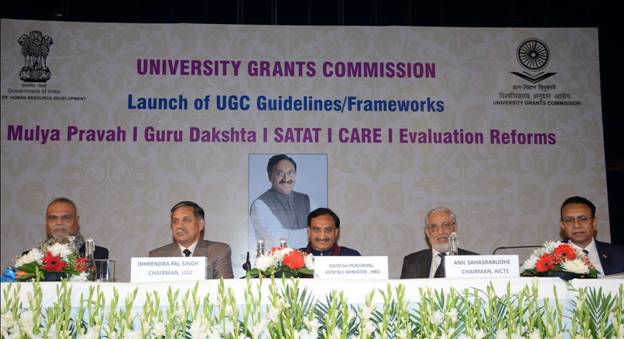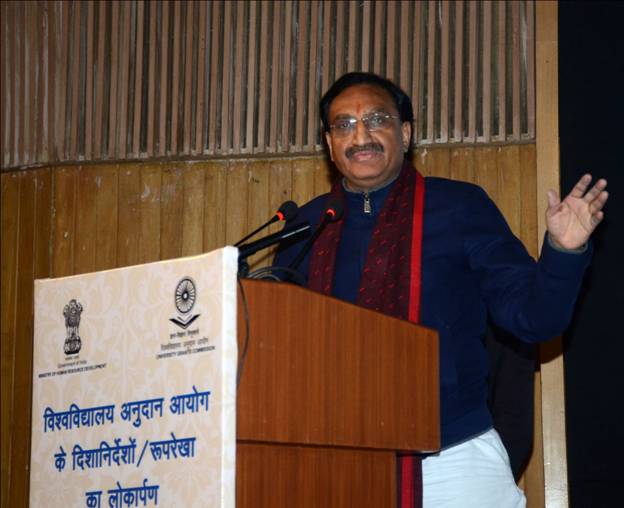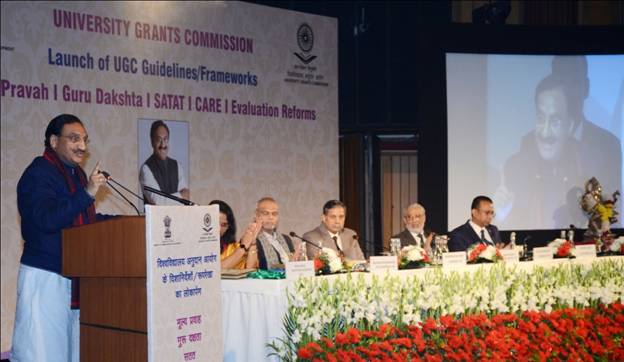Union HRD Minister Shri Ramesh Pokhriyal ‘Nishank’ launches5 documents covering the 5 verticals of Quality Mandate in Higher Educational Institutions
Student evaluation plays a crucial role in improving the quality of Higher Education in the country: HRD Minister
Union Human Resource Development Minister Shri Ramesh Pokhriyal ‘Nishank’ launched the 5 documents developed by UGC covering the 5 verticals of Quality Mandate in New Delhi today. These five documents cover evaluation reforms, eco-friendly and sustainable university campuses, human values & professional ethics, faculty induction and academic research integrity.

Speaking on the occasion Shri Nishank said that to improve the quality in Higher Educational Institutions, University Grants Commission has adopted the Higher Education Quality Improvement Programme Mandate. The quality mandate aims at evolving higher education system to equip country’s next generation with vital skills, knowledge and ethics for leading a rewarding life.
Union Minister of Human Resource Development ShriRamesh Pokhriyal ‘Nishank’ said that student evaluation plays a crucial role in improving thequality of Higher Education in the country. In order to make student assessment moremeaningful, effective and linked to ‘Learning Outcomes’, the report ‘Evaluation Reforms inHigher Educational Institutions in India’ is very timely and beneficial for HEIs.

Further referring to SATAT- Framework for Eco-Friendly and Sustainable Campusdevelopment in Higher Educational Institutions, he said that the framework encouragesuniversities to adopt reflective policies and practices to enhance the environmental quality of thecampus and to adopt sustainable green and sustainable methods in its future.
Recognising the need to discuss and streamline the process that helps to infuse the culture ofhuman values and ethics in educational institutions, UGC has also developed a policyframework- “MulyaPravah – Guidelines for Inculcation of Human values and ProfessionalsEthics in Higher Educational Institutions”.

In addition, he hoped that the Guidelines for Guru-Dakshta – A guide to Faculty InductionProgramme (FIP) will fulfill its main objective to sensitise and motivate the faculty to adoptlearner centred approaches, ICT integrated learning and new pedagogic approaches to teaching-learning, assessment tools in higher education
Speaking on the occasion, the Minister emphasized the importance of promoting highquality research and creation of new knowledge by faculty members. He lauded UGC’s effortsfor setting up a Consortium for Academic and Research Ethics (UGC-CARE) to continuouslymonitor and identify quality journals across disciplines. He also hoped that CARE website andReference List of Quality Journals will be useful to create more awareness and help the cause ofpromoting academic integrity and ethical publishing.
*****
NB/AKJ/AK/OA